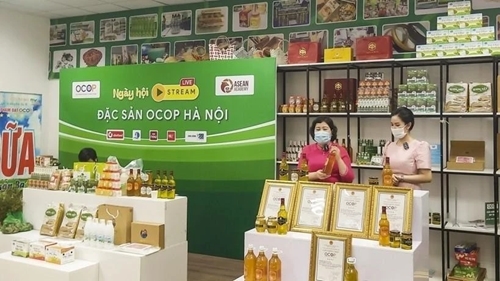With 1,350 craft villages, 40% of the country’s total, Hanoi is considered the cradle of OCOP development. Since 2019, the city has evaluated and rated 3,317 OCOP products, representing 21.3% of Vietnam’s total OCOP output. Among them are six five-star products, 22 five-star potential products, 1,571 four-star, and 1,718 three-star products, making Hanoi the national leader in the number of certified OCOP items.
A taste of tradition: Cu Da soya sauce
In Cu Da commune, located in Thanh Oai district, the traditional craft of making soya sauce has been preserved for generations. Despite advances in machinery and technology, the soya sauce here is still handcrafted using traditional methods and contains no additives.
    |
 |
|
With 1,350 craft villages, 40% of the country’s total, Hanoi is considered the cradle of OCOP development. |
Now a certified three-star OCOP product, Cu Da soya sauce is steadily winning over consumers nationwide with its distinctive flavor and rich aroma.
According to Vu Van Dinh, owner of a renowned handicraft workshop in Thuong hamlet, Chuyen My commune, Phu Xuyen district, the OCOP program has brought a breakthrough to Hanoi’s 1,000-year-old craft village. Specializing in woodwork, mother-of-pearl inlay, and lacquerware, his workshop has eight four-star OCOP products, with several undergoing the application process for five-star recognition.
“Since aligning our products with the OCOP program, we’ve become much more aware of quality, design, and the cultural story behind each item,” he said.
He added that support from local and city authorities in marketing and trade promotion has helped the village’s products reach a broader customer base, especially in the premium gift market.
Pushing for five-star recognition
By the end of 2024, Vietnam had nearly 15,000 OCOP products, with Hanoi alone contributing 3,317 items, or 22.1% of the national total. However, only six of Hanoi’s products have achieved five-star certification—a modest number given the capital’s vast potential and competitive edge.
Achieving five-star status remains a significant challenge, requiring strict criteria related to regional identity, community impact, and cultural storytelling.
Artisan Phan Thi Thuan, Director of My Duc Silk Co. Ltd. in Phung Xa commune, My Duc district, noted that while the company’s hand-woven silk quilt earned five-star OCOP certification in early 2023, other products such as silk scarves, lotus silk scarves, lotus-patterned silk weaves, and wedding pillows made from lotus silk have only been rated four stars.
“We’ve been striving to upgrade our four-star products to five-star ones for years,” she shared.
However, because the five-star evaluation process requires thorough documentation of regional characteristics and social impact, their products lack supporting evidence, resulting in delayed recognition.
According to Nguyen Dinh Hoa, Deputy Director of the Hanoi Department of Agriculture and Environment, the city organizes annual fairs, conferences, and trade weeks to support the development of OCOP products.
To enhance market visibility, Hanoi has established 16 innovation and design centers dedicated to promoting OCOP and craft village products, along with 110 showrooms and sales points, helping consumers easily recognize and purchase authentic OCOP goods.
This year, Hanoi will enhance the OCOP brand through various trade promotion events, including organizing OCOP Week and showcasing agricultural and craft village products, to boost consumer and tourist engagement.
Source: VNA